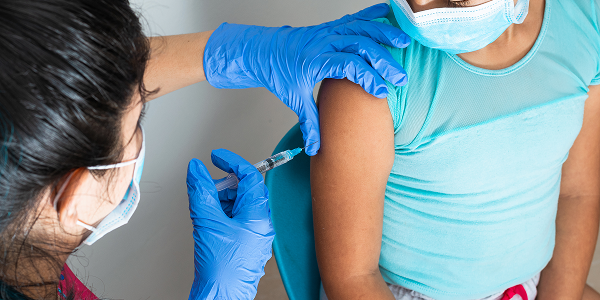
A Quick Guide to the NHS Childhood Vaccination Schedule
Vaccinations are one of the most important ways to protect your child’s health. From their very first weeks of life through to their teenage years, the NHS childhood vaccination schedule is carefully designed to provide the best protection at the right time.
This blog outlines the current NHS vaccination schedule at a glance, helping you stay on track with your child’s vaccine journey. Whether you’re a new parent or simply checking in, it’s a great time to make sure all vaccines are up to date.
If your child has missed any routine vaccinations, don’t worry — you can contact your GP to catch up.
Why Timing Matters
The timing of childhood vaccinations is important. Each vaccine is given at a specific age to provide the strongest protection when your child is most vulnerable to infection. Delaying or missing doses can leave them less protected — but it’s never too late to get back on schedule.
If you’re unsure whether your child is up to date, you can check their Red Book (the Personal Child Health Record) or speak to your GP practice.
Your Child’s Vaccine Schedule: Aged 0 to Teen
Here’s a simplified guide to the UK’s routine childhood vaccinations. This information follows the current NHS schedule. Always check nhs.uk/vaccinations for the most up-to-date guidance.

8 Weeks
Your child will be offered their first set of routine vaccines:
– 6-in-1 vaccine: Protects against diphtheria, tetanus, whooping cough (pertussis), polio, Hib (Haemophilus influenzae type b), and hepatitis B
– Rotavirus (1st dose): Protects against rotavirus, a common cause of diarrhoea and vomiting in babies
– MenB (1st dose): Protects against meningitis B, a serious bacterial infection
12 Weeks
The second round of early baby vaccines includes:
– 6-in-1 vaccine (2nd dose)
– Rotavirus (2nd dose)
– MenB (2nd dose)
This helps reinforce your child’s immune response and continue protection from these infections.
16 Weeks
By now, your child will receive:
– 6-in-1 vaccine (3rd dose)
– Pneumococcal vaccine: Helps protect against serious illnesses like pneumonia, sepsis, and meningitis caused by pneumococcal bacteria
1 Year Old
This is a key milestone in your child’s vaccine schedule, with several boosters and new vaccines:
– Hib/MenC booster (for children born on or before 30 June 2024): Protects against Haemophilus influenzae type b and meningitis C
– MMR (1st dose): Protects against measles, mumps and rubella
– Pneumococcal vaccine (2nd dose)
– MenB (3rd dose)
These vaccines are vital for maintaining protection into toddlerhood and beyond.
18 Months

If your child was born on or after 1 July 2024, the following vaccines are given at 18 months:
– 6-in-1 booster (4th dose): Provides longer-term protection
– MMR (2nd dose): Helps ensure full protection from measles, mumps and rubella
3 Years 4 Months (or soon after)
Your child will receive their pre-school boosters before starting school:
– MMR booster (for children born on or before 30 June 2024): Ensures strong and lasting immunity
– 4-in-1 Pre-school booster: Protects against diphtheria, tetanus, whooping cough, and polio
These vaccines prepare your child for starting school and being around more people — helping to keep them and others safe.
Vaccines for Older Children and Teenagers
As your child grows, a few additional vaccines help protect against more specific conditions.
12 to 13 Years Old
– HPV vaccine: Offered to all children in school Year 8. It protects against the human papillomavirus (HPV), which can cause cervical, mouth, throat, and other cancers later in life.
13 to 14 Years Old
– 3-in-1 Teenage Booster (Td/IPV): Top-up protection against tetanus, diphtheria and polio
– MenACWY vaccine: Protects against meningitis A, C, W and Y
These vaccines are typically given in secondary school as part of the school immunisation programme.

What If a Vaccine Was Missed?
It’s common for children to miss a vaccine for all sorts of reasons — illness, moving house, or changes in schedule. The good news is that you can catch up.
Your child can receive missed vaccines at any age, and it’s never too late to protect them. Speak to your GP or health visitor if you’re unsure, and they’ll guide you on the best next steps.
Your child’s Red Book (personal health record) should include vaccine dates and details — but if you’re missing information, your GP practice can help check records.
Why Routine Vaccinations Matter
Routine vaccines are essential for your child’s health and for protecting the wider population. They help prevent outbreaks of serious diseases and reduce the risk of complications from infections that can spread quickly in settings like nurseries, schools, or playgroups.
By following the NHS vaccine schedule, you’re giving your child the best possible start in life.
Download a Simplified Leaflet
If you’d prefer a quick-reference version of the vaccination schedule, we’ve created a simplified PDF leaflet. It’s ideal for saving, printing, or sharing with friends and family.
Stay Informed with Trusted Guidance
Always use reliable sources when looking for information about vaccines. There’s a lot of misinformation online, especially around childhood immunisations, so it’s important to stick with expert-backed advice.
For the full vaccination schedule and guidance from the NHS, visit:
You can also speak to your GP, practice nurse or pharmacist if you have questions or concerns.
Vaccination protects your child — and everyone around them. Stay on track with the NHS schedule and check in regularly with your child’s health record.





